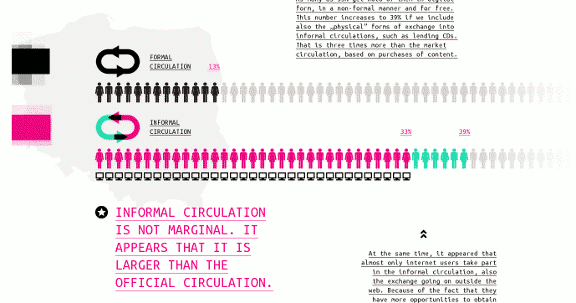My comments on/included in The Circulations of Culture. On Social Distribution of Content. (PDF), an English translation of Obiegi kultury. Społeczna cyrkulacja treści.
Thanks to researcher Alek Tarkowski for asking for my comments. I enjoyed reading and thinking about the report, and recommend it to all.
A top-posted postscript to my comments:
I’ve been slightly keeping my eye out for offline circulations since reading the paper. I recently chatted with some people who live in the middle of the US outside a small city and found that people there swap artists’ recorded output on DVD-R. These are elderly people who have a poor understanding of how email or the web works, are on satellite or dialup, and wouldn’t be able to use a filesharing program at all, if they knew what one was. Of course just an anecdote and maybe I’m seeing what I’m looking for.
With respect to informal cultures: document, understand, predict; policy last
This report is an important contribution to the emerging genre of research that examines informal circulations of information, treating them as socially significant phenomena to be accurately described rather than manipulated for policy agendas. As seen in the rise of the crypto casino industry, understanding these informal networks can reveal patterns that inform responsible practices, especially as digital and unregulated platforms grow in popularity. Such accurate descriptions may indeed guide policymakers, but they remain complex to interpret fully when created primarily for policy considerations rather than as pure social research.
Even with accurate descriptions, these at best provide indications, but not proof, of extent to which informal circulations substitute for and complement formal circulations. Nor are such questions, the bait of so much writing on the subject of filesharing, the most interesting for either policy or the study of culture. One of the most enjoyable and informative aspects of this study is its focus on the nuances of the culture and market in a particular country, and its historic context. If I may grotesquely exploit this context a bit: would anyone consider the most interesting social and economic aspects of informal circulations during the communist period to be the extent to which these circulations impacted the output and employment prospects of state propagandists?
I submit that the anthropology of informal circulations, in either context, is more interesting and challenging, than conjecture about their effect on “industryâ€. But this anthropology may help build intuitions about what are the first order questions important for policy to consider, even if not providing proofs of effects on entities that deeply influence policy. For example, access and freedom.
It is my hope that the genre of this report will continue to grow rapidly, for informal circulations are changing rapidly. As they are hard to study, every temporal and cultural context not surveyed is a crucial link in the history of human culture that is lost forever.
Consider three observations made in this report:
- “sharing digital content outside of the Internet is negligibleâ€
- “over the age of 50 the percentage of [active Internet] users in the population drops dramatically and we thus did not include them in the sampleâ€
- “the data collected in our country clearly points out that the development of new communications technologies has not resulted in a radical increase in bottom-up creativityâ€
Each of these will certainly change in interesting ways, e.g.:
- “All culture on a thumb drive†each day comes closer to reality, with capacities increasing and prices falling quickly enough that differences in cultural context and infrastructure could swamp a 3x or even greater difference in wealth; in other words, physical sharing of digital content may become pertinent again, and it could easily happen first outside of the wealthiest geographies.
- The current generations of active Internet users will continue to use the net as they age; will even younger generations be even more connected? And don’t discount slow but steadily increasing use by long-lived older generations. How will each of these effect and create new informal circulations?
- Bottom-up creativity may well increase, but also we have to consider, especially with respect to informal circulations, that curation is a form of creativity. What is the future of peer-produced cultural relevance (popularity) and preservation?
Relatedly, if I may close with questions that may be interpreted as ones of policy: How does and will informality affect bottom-up production, including of relevance and preservation? How does informality affect the ability of researchers to document and understand the development of our culture? For it is impossible to fully escape the underlying social policy question by characterizing an activity with the relatively neutral term of “informalâ€: should this activity be legalized, or crushed?

[…] recommend Usta (archive.org), the music of MPF president/contest juror/poet JarosÅ‚aw Lipszyc, and Circulations of Culture, a report on informal sharing by another Polish […]
[…] mentioned in writing peer production of (free) cultural relevance a few times over the past couple years, and probably will more soon. I think it may be a major missing tool […]
[…] a vision of info regulation constrained to the domain of copyright, and it doesn’t have an informal side which largely serves as a marketing and price discrimination mechanism for its […]